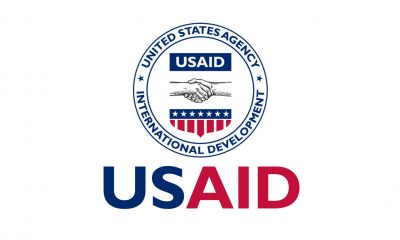Ict/Telecom
Applicants Decry JAMB Registration Process

Some prospective candidates say they are facing poor internet network, stressful and cumbersome process in registering for the 2017 Unified Tertiary Matriculation Examination (UTME) in Ebonyi, Abia and Imo, states.
The Tide Source who monitored the situation in these three states, reports that there are long queues at the banks and registration centres, including JAMB Offices.
In Abakaliki, the prospective candidates suggested inclusion of more banks in the sale of JAMB forms.
According to them, in Abakaliki on Tuesday using only two banks – Union Bank and Unity Bank – to sell forms to thousands of prospective candidates was frustrating.
The candidates claimed that some of them had spent many days without obtaining the form, even as some who don’t have relatives, had to come to the state capital every day in an attempt to buy the form.
They expressed fears that many prospective candidates might not purchase the forms within the specified time frame, unless urgent steps was taken to remedy the situation.
Messrs Victor Nkpuma, Richard Okafor, Philip Onwe and Miss Eunice Oko, said that the two banks were inadequate for Ebonyi and called for inclusion of more banks, to ease the process.
“The idea of using only Union Bank and Unity Bank for the sale of the form to me is not the best for the state because the two banks can hardly serve the purpose adequately.
“There was almost a stampede in Unity bank the other day because the crowd was so much and the bank’s security personnel could not control the crowd because everybody wanted to get the form at the same time.
“There should be an inclusion of more banks to ease the frustration and pain that those coming to obtain the form are made to go through and again many people may not be able to get the form within the time frame, Nkpuma said.
Okafor decried the current registration procedures, and described it as more tedious, complex, time and money consuming.
According to him, candidates are first expected to go to JAMB office and fill a profile form that would contain his or her e-mail address linked to the JAMB website.
The candidates after filling the profile, would go to a designated bank with the form issued to them at the JAMB office and buy the entrance form at the cost of N5,5000.
According to him, candidates are still required to pay additional N700 to collect JAMB brochure and a novel at designated banks.
“The procedure is frustrating, cumbersome, time and money consuming and I am afraid that many intending candidates may miss, if the board doesn’t relax the tedious process.
“Again having only two banks to serve the whole of Ebonyi in the sale of the form is an unthinkable action because many will definitely miss out,” Okafor said.
Meanwhile, Onwe and Oko have urged the board to reduce the fee payable by prospective candidates, to make it possible for indigent candidates to obtain the form.
They also urged JAMB to give more banks permission to sell the forms to candidates.
“The procedure adopted by JAMB in the 2017 sale of the UTME form is frustrating, time and money consuming unlike in the previous method where a candidate goes to a cyber cafe and do the online registration.
“The former procedure was simple, easy, less stressful, less time and money consuming,” they said.
In Owerri, the candidates told The Tide online source, that the problem of invalid Personal Identification Numbers (PIN) had contributed to delays in the registration process.
A candidate, Johnson Nnadozie, said he paid at Sterling bank and received a PIN, which he had been unable to use since, adding that he had gone back to the bank severally and was told to keep retrying with the same PIN.
Gift, said that the centre collected additional charges for creating JAMB profile and e-mail for applicants who had no personal email.
“There are some applicants who use their cellphones to create the JAMB profile, using their e-mail. Such people pay the JAMB registration fee of N2,500 only,” Gift said.
Ict/Telecom
Technology, Others Responsible For Nigeria’s Bonga Oil Operations
The Managing Director, Shell Nigeria Exploration and Company Limited (SNEPCo), Elohor Aiboni, said Bonga, Nigeria’s first deep-water asset, has recorded major milestones, due to effective leadership, cutting-edge technology, continuous improvement and collaboration with stakeholders.
She noted that since coming on stream in November 2005, Bonga has maintained a track record of production that saw it achieve one-billion-barrel export on February 13, last year.
In her presentation, titled “The Bonga Journey to a Billion Barrels”, at the ongoing 2024 Offshore Technology Conference in Houston, Texas, United States, Aiboni, said: “SNEPCo is grateful for the contributions of all the parties to the Bonga story and we can all be proud of the milestones.
“Bonga has been consistent. In 2014, nine years after coming onstream, it achieved half a billion barrels of crude and doubled it in 2023. We have worked relentlessly to ensure excellent asset management, project and wells delivery and deployment of technology and innovations in our operations”.
According to her, these factors, “coupled with the supportive partnership of the Nigerian National Petroleum Company Limited and our co-venturers – TotalEnergies, EP Nigeria Limited; Nigerian Agip Exploration; and Esso Exploration and Production Nigeria Limited, make Bonga stand out as a world-class investment case”.
She continued that, “SNEPCo also enjoyed the support of the Nigerian Upstream Petroleum Regulatory Commission (NUPRC) and the Nigerian Content Development and Monitoring Board (NCDMB) in the success of Bonga operations”.
Aiboni also listed the challenges of keeping the Bonga Floating Production, Storage and Offloading vessel full as the asset ages and dealing with unexpected developments with subsea wells and equipment.
She said: “SNEPCo responded with a campaign of operational excellence, which among other initiatives, led to the creation of a programme known as the Bonga Business Improvement Plan that continually reviews and identifies improvement initiatives and drives sustainability in operations and upskilling of staff.
“The Bonga success story has been led by Nigerians who have been managing directors of SNEPCo since it was established in 1993, in a deliberate policy by Shell to develop indigenous manpower for deep-water operations in Nigeria.
“Today, some 97percent of the SNEPCo workforce is Nigerian and overall, Bonga has helped to create a new generation of Nigerian deep-water professionals.
“Our vision at SNEPCo remains to be the best deep-water business, powering growth and achieving net zero emissions in line with Shell’s Powering Progress strategy”.
Ict/Telecom
Banks Cut Borrowing From CBN By 44%
Banks’ borrowings from the Central Bank of Nigeria (CBN) fell month-on-month, (MoM) by 44 percent to N12.16 trillion in April from N21.7 trillion in March.
Analysis of latest data from the CBN shows that the 44percent drop represents the first MoM decline in banks borrowing from since January when it increased by 268.7 percent to N3.6 trillion from N976.29 billion in December 2023.
However, further analysis showed that banks’ deposits in the CBN SDF grew MoM by 118.4 percent to N428.97 billion in April from N196.37 billion in March 2024.
Banks make use of the SLF to access liquidity to run their day-to-day business operations while the Standing Deposit Facility window (SDF) on the other hand, is an overnight deposit facility that allows banks to lodge excess liquidity (money) with the CBN and earn interest.
The decline in banks’ borrowing from SLF may reflect an increase in banking system liquidity and also the decision of the apex bank last year to remove the limit on the remunerable daily placements by banks at the SDF.
According to the CBN Governor, Mr. Olayemi Cardoso, the CBN removed the cap on the remunerable SDF to increase activity in the SDF window and manage liquidity.
Ict/Telecom
Expert Highlights Technology Impact On Fintech Industry Growth
A Financial technology expert, Olatunji Akinrinola, has highlighted the exponential growth of the FinTech industry, which according to him, was driven by technological advancements.
Akinrinola made this assertion in a press release recently, where he stressed that the role of technology in driving this exponential growth in the FinTech sector was very outstanding.
According to him, Technology has revolutionised the way financial services are delivered, making them more accessible, efficient, and inclusive.
“Through innovations such as mobile banking, digital payments, and blockchain technology, FinTech companies have been able to reach a larger population and provided them with access to financial services”, he stated.
Akinrinola emphasised the role of technology in enabling financial inclusion, adding: “Technology has democratised access to financial services, particularly in regions with limited banking infrastructure.
“Mobile money platforms and digital wallets have empowered individuals to conduct financial transactions conveniently and securely, without the need for traditional banking services”.
He also underscored the role of Artificial Intelligence (AI) and data analytics in driving innovation within the FinTech industry, noting: “AI-powered algorithms and predictive analytics have revolutionised risk assessment, fraud detection, and customer personalisation in financial services.
“These technologies enable FinTech companies to provide tailored solutions and mitigate risks more effectively, ultimately enhancing the overall customer experience”.
Akinrinola stressed the importance of regulatory frameworks in fostering the growth of the FinTech industry.
“While technology has accelerated the growth of FinTech, it is essential to establish robust regulatory frameworks to ensure consumer protection and maintain market stability. Regulators play a crucial role in balancing innovation with risk management, thereby creating a conducive environment for the sustainable growth of the FinTech sector”, he stated.
Akinrinola underscored the role of technology in driving the exponential growth of the FinTech industry, saying, “Technology has been a game-changer for the FinTech sector, enabling innovation, expanding access to financial services, and driving economic growth.
“As technology continues to evolve, the FinTech industry will undoubtedly play a significant role in shaping the future of financial services ecosystem”.
Corlins Walter
-
Rivers24 hours ago
Orazi Gas Explosion: 3 Confirmed Dead
-
Rivers1 day ago
ONELGA BOSS ADVICE YOUTHS ON PEACEFUL PATH
-
Women24 hours ago
Girl-Child Development And Early Marriage
-

 World1 day ago
World1 day agoPope Francis urges global dialogue to prevent world war
-
Rivers24 hours ago
JONAPWD Elections: Commissioner Inaugurates 5-Man Committee
-
Politics1 day ago
When Women Unite To Pray For SIM
-

 Business23 hours ago
Business23 hours agoUSAID Re-emphasizes Agricultural Collaboration With Nigeria
-

 Featured1 day ago
Featured1 day agoWe’ve Only One House Of Assembly Led By Oko-Jumbo, Fubara Clarifies …Signs Into Law N1.188trn Rivers 2025 Budget

